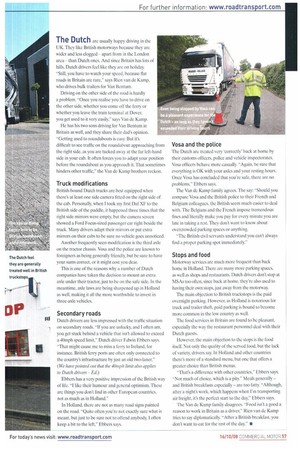The Dutch are usually happy driving in the UK. They
Page 57

If you've noticed an error in this article please click here to report it so we can fix it.
like British motorways because they are wider and less clogged apart from in the London area than Dutch ones. And since Britain has lots of hills, Dutch drivers feel like they are on holiday. "Still, you have to watch your speed, because flat roads in Britain are rare," says Rien van de Kamp, who drives bulk trailers for Van Bentum.
Driving on the other side of the road is hardly a problem. "Once you realise you have to drive on the other side, whether you come off the ferry or whether you leave the train terminal at Dover, you get used to it very easily," says Van de Kamp.
He has his two sons driving for Van Bentum in Britain as well, and they share their dad's opinion. "Getting used to roundabouts is easy But it's difficult to see traffic on the roundabout approaching from the right side, as you are tucked away at the far left-hand side in your cab. It often forces you to adapt your position before the roundabout as you approach it. That sometimes hinders other traffic," the Van de Kamp brothers reckon.
Truck modifications British-hound Dutch trucks are best equipped when there's at least one side camera fitted on the right side of the cab. Personally, when I took my first Daf XF to the British side of the puddle, it happened three times that the right side mirrors were empty, but the camera screen showed a Ford Focus-sized passenger car right beside the truck. Many drivers adapt their mirrors or put extra mirrors on their cabs to be sure no vehicle goes unnoticed.
Another frequently seen modification is the third axle on the tractor chassis. Vosa and the police are known to foreigners as being generally friendly, but be sure to have your sums correct, or it might cost you dear.
This is one of the reasons why a number of Dutch companies have taken the decision to mount an extra axle under their tractor, just to be on the safe side. In the meantime, axle laws are being sharpened up in Holland as well, making it all the more worthwhile to invest in three-axle vehicles.
Secondary roads Dutch drivers are less impressed with the traffic situation on secondary roads. "If you are unlucky, and I often am, you get stuck behind a vehicle that isn't allowed to exceed a 40mph speed limit," Dutch driver Edwin Ebbers says. -That might cause me to miss a ferry to Ireland, for instance. British ferry ports are often only connected to the country's infrastructure by just an old two-laner," (We have pointed out that the 40n1ph limit also applies to Dutch drivers Ed.)
Ebbers has a very positive impression of the British way of life. "I like their humour and general optimism. These are things you don't find in other European countries, not as much as in Holland."
In Holland, there are not as many road signs painted on the road. "Quite often you're not exactly sure what is meant, but just to be sure not to offend anybody. I often keep a bit to the left," Ebbers says. Vosa and the potice The Dutch are treated very 'correctly' back at home by their customs officers, police and vehicle inspectorates. Vosa officers behave more casually. -Again, be sure that everything is OK with your axles and your resting hours. Once Vosa has concluded that you're safe, there are no problems," Ebbers says.
The Van de Kamp family agrees. The say: -Should you compare Vosa and the British police to their French and Belgium colleagues, the British seem much easier to deal with. The Belgians and the French impose tremendous fines and literally make you pay for every minute you are late in taking a rest. They don't want to know about overcrowded parking spaces or anything.
"The British civil servants understand you can't always find a proper parking spot immediately."
Stops and food Motorway services are much more frequent than back home in Holland. There are many more parking spaces, as well as shops and restaurants. Dutch drivers don't stop at MSAs too often, since back at home, they're also used to having their own stops, just away from the motorway.
The main objection to British truckstops is the paid overnight parking. However, as Holland is notorious for truck and trailer theft, paid parking is bound to become more common in the low country as well.
The food services in Britain are found to be pleasant, especially the way the restaurant personnel deal with their Dutch guests.
However, the main objection to the stops is the food itself. Not only the quality of the served food, but the lack of variety, drivers say. In Holland and other countries there's more of a standard menu, but one that offers a greater choice than British menus.
"That's a difference with other countries," Ebbers says. "Not much of choice, which is a pity." Meals generally and British breakfasts especially are too fatty. "Although, after a night's work, which happens when I'm transporting air freight, it's the perfect start to the day," Ebbers says.
The Van de Kamp family disagrees. "Food isn't a good a reason to work in Britain as a driver," Rien van de Kamp tries to say diplomatically. "After a British breakfast, you don't want to eat for the rest of the day."
















































































































































































